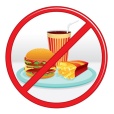Diabetes is a chronic disease that has reached great proportions among people, the world over. When diabetes is uncontrolled, it can have serious complications such as heart disease, kidney disease, blindness, and other complications. What is more important is that eating the wrong foods can raise your blood sugar and insulin levels and this also promotes inflammation that can raise the risk of this disease.
Carbs, proteins, and fats are the macronutrients that provide your body with energy. Carbs are known to have the greatest effect on your blood sugar levels so far. This is because carbs include starch, sugar, and fiber. But when people with diabetes consume too many carbs at a time, then their blood sugar levels can rise to a dangerous level.
Read further to know which are the foods to avoid with diabetes.
Sugar-Sweetened Beverages:
These are loaded with carbs and fructose that are strongly linked with insulin resistance and diabetes. Studies have suggested that consuming sugar-sweetened beverages can increase the risk of diabetes-related conditions like fatty liver.
Carbs, proteins, and fats are the macronutrients that provide your body with energy. Carbs are known to have the greatest effect on your blood sugar levels so far. This is because carbs include starch, sugar, and fiber. But when people with diabetes consume too many carbs at a time, then their blood sugar levels can rise to a dangerous level.
Read further to know which are the foods to avoid with diabetes.
Sugar-Sweetened Beverages:
These are loaded with carbs and fructose that are strongly linked with insulin resistance and diabetes. Studies have suggested that consuming sugar-sweetened beverages can increase the risk of diabetes-related conditions like fatty liver.
White Bread, Pasta And Rice:
These are high carb, processed foods. Eating such refined-flour foods has been shown to increase blood sugar levels in people with type 1 and type 2 diabetes.
These are high carb, processed foods. Eating such refined-flour foods has been shown to increase blood sugar levels in people with type 1 and type 2 diabetes.
Sweetened Breakfast Cereals:
These cereals are highly processed and contain more carbs than anything else. Also, these contain hardly any protein, which is a nutrient responsible for keeping the blood sugar levels stable. This is one of the foods to avoid diabetes.
These cereals are highly processed and contain more carbs than anything else. Also, these contain hardly any protein, which is a nutrient responsible for keeping the blood sugar levels stable. This is one of the foods to avoid diabetes.
Dried Fruits:
When fruits are dried, the process results in a loss of water that leads to an even higher concentration of sugars. Hence, it is strictly prohibited for diabetics to have these in excess.
Fruit Juice:
The effect of fruit juice on blood sugar is similar to that of sodas and other drinks. These contain added sugar that is higher in carb content when compared to a regular soda.








